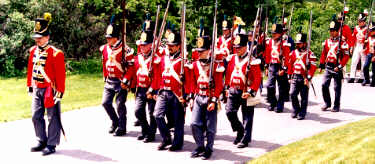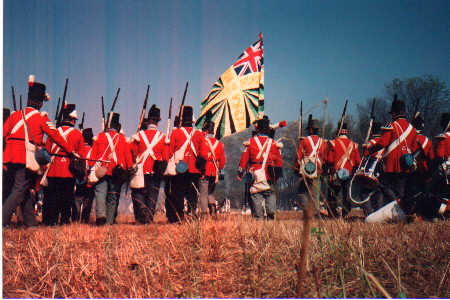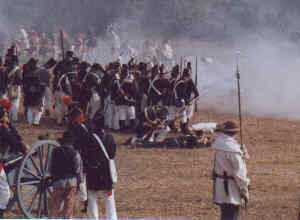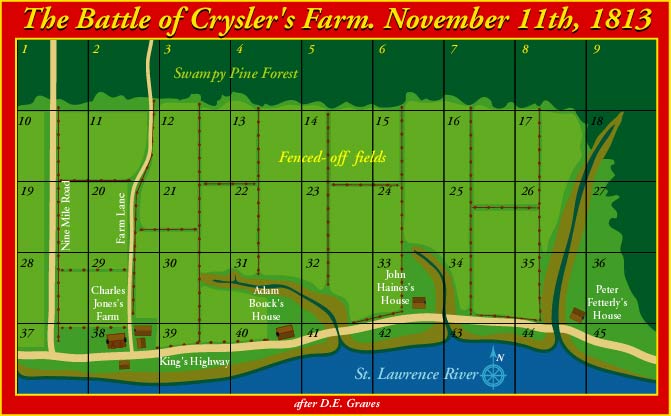|
|
|
-presents-

The Battle Of Crysler's Farm, 11 November, 1813
Stalemated in the Niagara region by fierce counter-attacks
by British, Canadian and
Indian forces, the United States requires a great victory
to bring this unpopular war to
a swift conclusion. Unfortunately neither the Secretary of
War, the Commander-in-
Chief, nor the most Senior officers of the army can agree
on a target for the large
body of troops available. Some want to reinforce the Niagara
front, and march around
lake Ontario and eventually attack Kingston, the heart of
Upper Canada's defences;
others want a direct attack on Kingston. The council that
prevails is the most direct;
A two-pronged attack on Montreal. If it falls, the war will
surely end gloriously soon
after.
Unfortunately, the spirit is willing but the flesh is extremely
weak. Untrained regular
forces, poor supplies, and the worst crop of Generals in American
history conspire to
bring about one of America's most humiliating defeats on the
battlefield.
Major General James Wilkinson leads an army of 7000 down the
St. Lawrence river.
He is pursued by a small but determined force of British who
have disobeyed orders
and decided to force battle on a host almost six times it's
size. Physically ill, harassed
by insubordinate officers, sniped at mercilessly from every
bend in the river, James
Wilkinson turns three brigades of his army around to crush
the dogs barking at his
heels.
- The Combatants -
NOTE: Figure Scale is 1:20

British, Canadian,
and Indian forces:
Commander-in-Chief : Lt. Col. Joseph Wanton
Morrison
1st Brigade: Commanded by Lt. Col. Charles
Plenderleath
89th Foot Reg't
12 figures, Veteran
49th Foot Reg't ("Green Tigers")
16 figures, Veteran
Advance (2nd) Brigade: Commanded by Lt. Col.
Thomas Pearson
Light & Grenadier Companies of 49th &
detachment
of Canadian Fencible Reg't
9 figures, Converged (light)
89th Foot Reg't (detachment)
8 figures, Veteran
Light (3rd) Brigade: Commanded by Maj. Frederick
G. Heriot
Canadian Voltigeurs & Provincial Dragoons
(on foot)
8 figures, Veteran Fencibles (light)
Mohawk Indians
3 figures, Interested
Unbrigaded:
Jackson's Command, Royal Artillery
2 Medium guns (6 pdr.) and crew
Kersteman's Command, Royal Artillery
1 Medium gun (6 pdr.) and crew

US Regular forces:
Commander-in-Chief : Brig. Gen. John Boyd
1st Brigade: Commanded by Col. Issac Coles
Twelfth Infantry
12 figures, Poor
Thirteenth Infantry ("Snorters")
12 figures, Line
3rd Brigade: Commanded by Brig. General Leonard
Covington
Twenty-Fifth Infantry
18 figures, Poor
Sixteenth Infantry
12 figures, Veteran
Nineth Infantry
15 figures, Line
4th Brigade: Commanded by Brig. General Robert
Swartout
Twenty-First
Infantry
20 figures, Veteran
Eleventh Infantry
15 figures, Line
Fourteenth Infantry
6 figures, Poor
-Reinforcements-
Enter on road in area 45 on turn 8
Unbrigaded:
Craig's Command, U.S. Light Artillery Corps
4 Medium Guns (6 pdr.)
Enter from areas 27, 36, or 45 on turn 18
Lt. Col. Timothy Upham's Boat Guards
30 figures, Line
- The Field of Battle -

U.S. Regulars
Mayset
up in boxes 9, 18, 27, 36 & 45.
United States:
Drive Enemy from field or make them pass their
Army Morale level.
This must be done before turn 18, or the Americans
will not score a
decisive victory. If the victory conditions
are achieved after turn 18,
it will be considered to be only a minor victory.
Terrain:
Ditches-
The ditches shown are major obstacles; any
unit entering them must
immediately halt and move not further that
turn. When moving off of
them the unit is immediately considered disordered.
Fences-
Units moving through "clear" terrain is considered
to be moving through
ploughed fields and fences. All units gain
disorder factors at twice the normal rate.
(See newest rules revision).